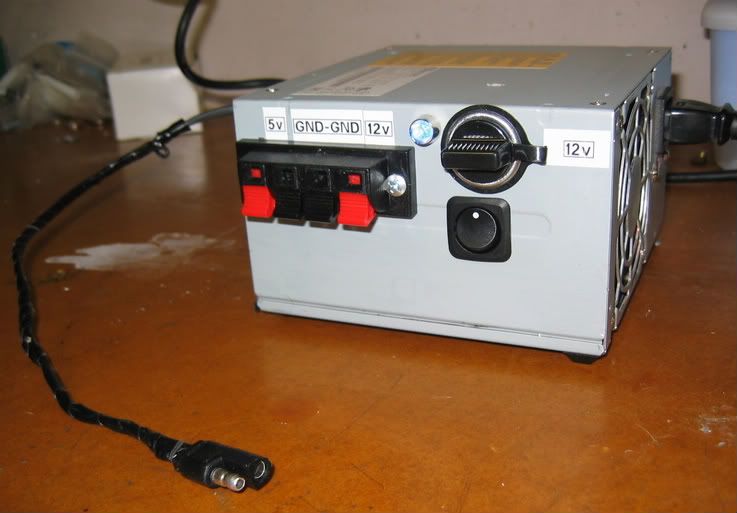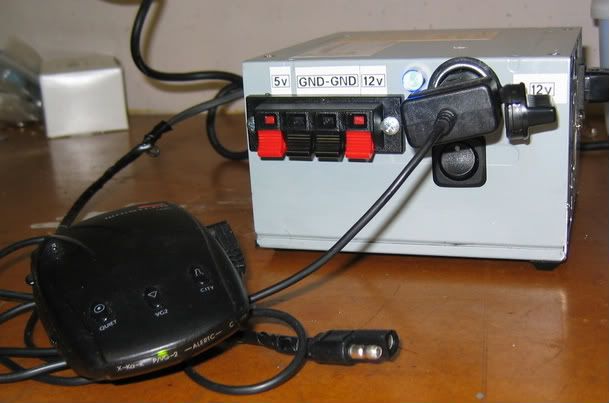I often have needed a power supply for bench testing 12v auto/motorcycle accessories such as radios, GPS, heated vests etc. I considered using a wall adaptor for cell phones electronics but I found they don't put out much current.
I found these series of plans on the internet for building a bench-top power supply using a discarded computer power supply:
http://www.wikihow.com/Image:Two_642.jpg
http://www.wikihow.com/Create-a-12-Volt-...er-Power-Supply
http://www.wikihow.com/Convert-a-Computer-ATX-Power-Supply-to-a-Lab-Power-Supply
Following the JPG that explains the simple wiring connections, I ended up with this:

This was a nice little tuesday night project. All that is needed is:
- Computer power supply (had a few in the basement)
- 12v cigarette lighter outlet
- Radio Shack speaker/binding post
- LED and chrome LED housing
- SPST On/Off switch
- SAE plug
- Some stick-on rubber feet
It results in a handy powerful/clean supply of 12v (I also added a single 5v outlet as many things like cell phones/blackberries run on 5v). Raw wires can be connected at the speaker style outlets (5 or 12v). Cigarette lighter accessories can be plugged directly into the outlet, and things like heated vests etc. can be plugged into the SAE plug.
It took a few hours mostly of drilling holes in the case to accommodate the lighter mount and speaker outlets as well as soldering the appropriate wires and insulating the unused ones.
I think I spent about $20-$25 on this project (the power supply was free) and from what I can see, an decent lab power supply is well over $100. Plus it was an interesting way to spend an evening (once the leg-work of collecting all of the necessary parts was done).
It is not a difficult job for anyone that has ever messed around with electronics/soldering. I think it will be very handy for testing 12v accessories before wiring them up to the bike or car. It's not always convenient to have an old 12v battery or to connect to the car's battery for this purpose.
Here's a shot of the power supply powering up my old radar detector:

For what its worth, I recommend the project to anyone that regularly messes with their automotive or motorcycle electrical system/accessories.
Of course, use at your own risk, check the connections, read and re-read the instructions, and don't try this without knowing what you are doing and taking the appropriate precautions. Line voltage can kill.
I found these series of plans on the internet for building a bench-top power supply using a discarded computer power supply:
http://www.wikihow.com/Image:Two_642.jpg
http://www.wikihow.com/Create-a-12-Volt-...er-Power-Supply
http://www.wikihow.com/Convert-a-Computer-ATX-Power-Supply-to-a-Lab-Power-Supply
Following the JPG that explains the simple wiring connections, I ended up with this:

This was a nice little tuesday night project. All that is needed is:
- Computer power supply (had a few in the basement)
- 12v cigarette lighter outlet
- Radio Shack speaker/binding post
- LED and chrome LED housing
- SPST On/Off switch
- SAE plug
- Some stick-on rubber feet
It results in a handy powerful/clean supply of 12v (I also added a single 5v outlet as many things like cell phones/blackberries run on 5v). Raw wires can be connected at the speaker style outlets (5 or 12v). Cigarette lighter accessories can be plugged directly into the outlet, and things like heated vests etc. can be plugged into the SAE plug.
It took a few hours mostly of drilling holes in the case to accommodate the lighter mount and speaker outlets as well as soldering the appropriate wires and insulating the unused ones.
I think I spent about $20-$25 on this project (the power supply was free) and from what I can see, an decent lab power supply is well over $100. Plus it was an interesting way to spend an evening (once the leg-work of collecting all of the necessary parts was done).
It is not a difficult job for anyone that has ever messed around with electronics/soldering. I think it will be very handy for testing 12v accessories before wiring them up to the bike or car. It's not always convenient to have an old 12v battery or to connect to the car's battery for this purpose.
Here's a shot of the power supply powering up my old radar detector:

For what its worth, I recommend the project to anyone that regularly messes with their automotive or motorcycle electrical system/accessories.
Of course, use at your own risk, check the connections, read and re-read the instructions, and don't try this without knowing what you are doing and taking the appropriate precautions. Line voltage can kill.
